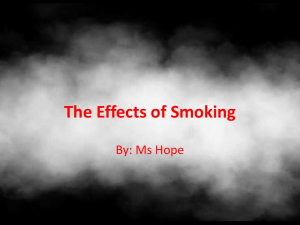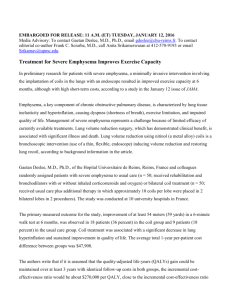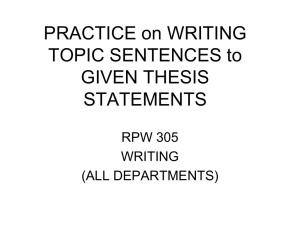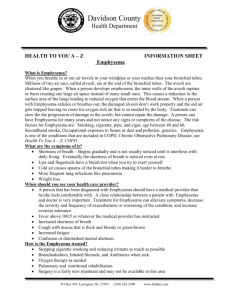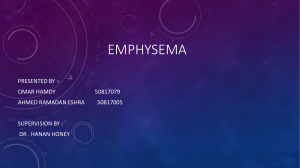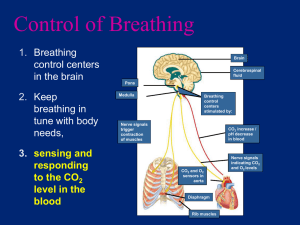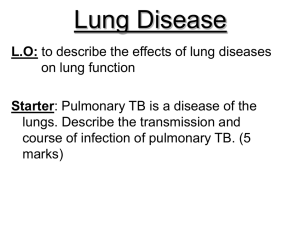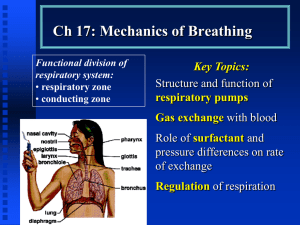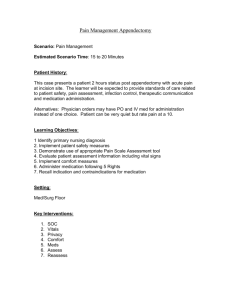script number 113 emphysema
advertisement
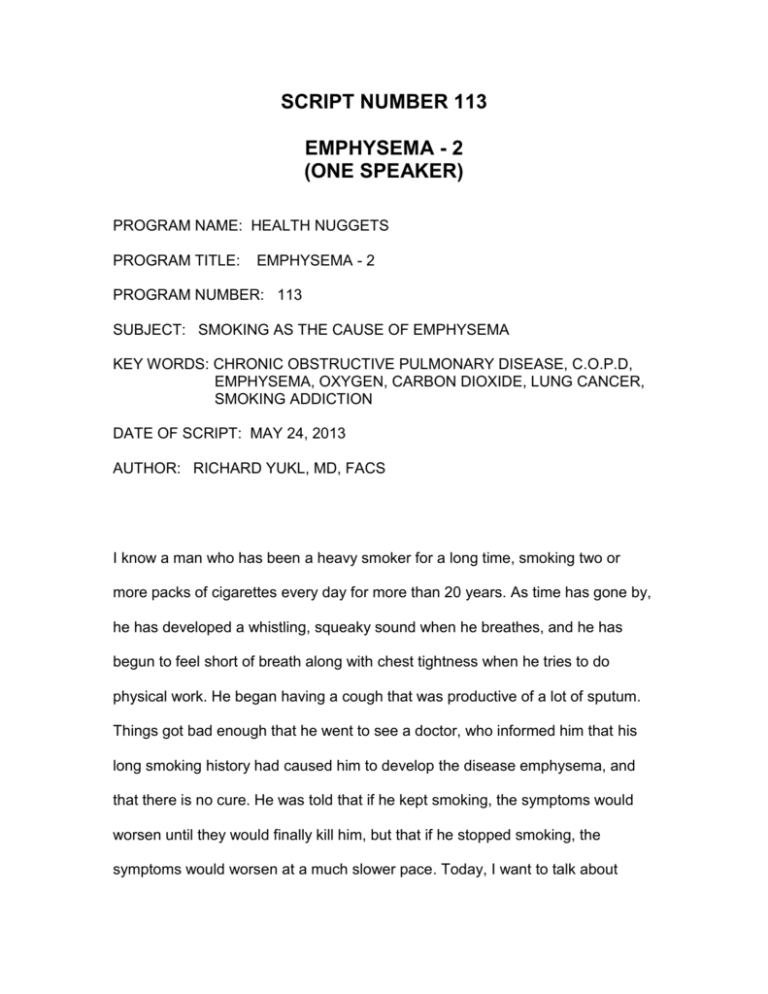
SCRIPT NUMBER 113 EMPHYSEMA - 2 (ONE SPEAKER) PROGRAM NAME: HEALTH NUGGETS PROGRAM TITLE: EMPHYSEMA - 2 PROGRAM NUMBER: 113 SUBJECT: SMOKING AS THE CAUSE OF EMPHYSEMA KEY WORDS: CHRONIC OBSTRUCTIVE PULMONARY DISEASE, C.O.P.D, EMPHYSEMA, OXYGEN, CARBON DIOXIDE, LUNG CANCER, SMOKING ADDICTION DATE OF SCRIPT: MAY 24, 2013 AUTHOR: RICHARD YUKL, MD, FACS I know a man who has been a heavy smoker for a long time, smoking two or more packs of cigarettes every day for more than 20 years. As time has gone by, he has developed a whistling, squeaky sound when he breathes, and he has begun to feel short of breath along with chest tightness when he tries to do physical work. He began having a cough that was productive of a lot of sputum. Things got bad enough that he went to see a doctor, who informed him that his long smoking history had caused him to develop the disease emphysema, and that there is no cure. He was told that if he kept smoking, the symptoms would worsen until they would finally kill him, but that if he stopped smoking, the symptoms would worsen at a much slower pace. Today, I want to talk about emphysema, the damage it does to your lungs, and what you can do if you are developing early symptoms of the disease. Our bodies use oxygen from the air we breathe as fuel, giving our cells the energy they need to function properly. God created a delicate mechanism that allows our body access to the oxygen in air. Our breathing tubes branch out inside our lungs like an upside-down tree. At the end of each branch of that tree are small, balloon-like air sacs. In healthy people, both the breathing tubes and the air sacs are springy and elastic. When we breathe in, each tiny air sac fills with air like a small balloon, and the balloon deflates when we breathe out. In the air sacs, an exchange is made between oxygen from the air, and carbon dioxide, a waste product made by our body. Oxygen from the air is absorbed into our body, and carbon dioxide from our body is put back into the air. Chronic obstructive pulmonary disease, also known as C.O.P.D, refers to a group of diseases that mechanically block air from flowing freely into and out of our lungs, making it hard for us to breathe. Emphysema is the most common form of C.O.P.D. It is the world’s fourth leading cause of illness and death. It does our body serious damage by weakening the walls of both our breathing tubes and the air sacs, making them less elastic and more floppy. Once the breathing tubes become floppy, they tend to collapse when we breathe out, trapping air inside our lungs. The air in our lungs cannot escape. Emphysema also slowly destroys the walls between the tiny air sacs, reducing the amount of surface area available to exchange oxygen for carbon dioxide. Symptoms of emphysema do not appear until significant lung damage has already occurred. The symptoms vary, but most people experience shortness of breath, wheezing, chest tightness and a chronic cough that produces a thick material called sputum. They feel short of breath because the chest wall muscles have to work hard to get air into and out of the lungs. In general, the symptoms will worsen over time. Complications of emphysema include problems such as lung infections. You are more likely to develop colds and pneumonia than the normal person, and the lung infections will cause further damage to your lung tissues. High blood pressure is another complication because the heart has to work very hard to push blood through damaged lungs. Finally, depression is a problem with emphysema. Breathing problems can keep you from doing the activities you enjoy, and it is very hard to mentally deal with a disease that is both progressive and incurable. Long-term smoking is, by far, the most important risk factor for developing the disease. The more years you smoke, and the more packs of cigarettes you smoke every day, the greater your risk of developing the disease. Pipe smokers, cigar smokers, marijuana smokers and people exposed to large amounts of second hand smoke are all at risk. Because there is no cure for emphysema, and because the lung damage that it causes cannot be reversed, you might wonder if treatments are of any positive effect. What should you or to my friend, the man with worsening symptoms, do? The good news is that if you are successful in your efforts to stop smoking, progression of your lung damage will slow dramatically. Also, there are medicines that help to lessen the symptoms you may experience. Some medicines relax the muscles around your breathing tubes, making it easier to breathe, and lessening your cough and feelings of shortness of breath. There are other medicines called steroids that you can inhale to reduce the inflammation of your breathing tubes. Unfortunately, long-term use of steroids causes other serious complications. Antibiotics will help fight infections within your lungs when they occur, but they should only be used when necessary. Supplemental oxygen can help you tolerate physical activity if you aren’t getting enough oxygen into your blood because of emphysema. If used during sleep, oxygen will help you rest better. At times, a surgeon can remove some of your damaged lung tissues, allowing the remaining lung tissues to work more efficiently, or a lung transplant may be an option in places where such technology is available. Because treatments for emphysema are both complicated and expensive, the smartest thing anyone can do is to prevent getting the disease in the first place. Unlike many other diseases, emphysema has a clear cause and a clear path of prevention. The vast majority of cases are directly related to smoking, so don’t start smoking, or quit smoking if you now smoke. Smoking is a difficult addiction to break, and breaking the smoking addiction will be the subject of our next broadcast. Health Nuggets is written by Dr. Richard Yukl, a medical doctor working in the United States. The medical views expressed in this program are his and may differ for your particular health needs. If you need medical advice, please consult a medical professional in your area.
